Thomas James Richards, Diaries, Transcript Vol. 2 - Part 7
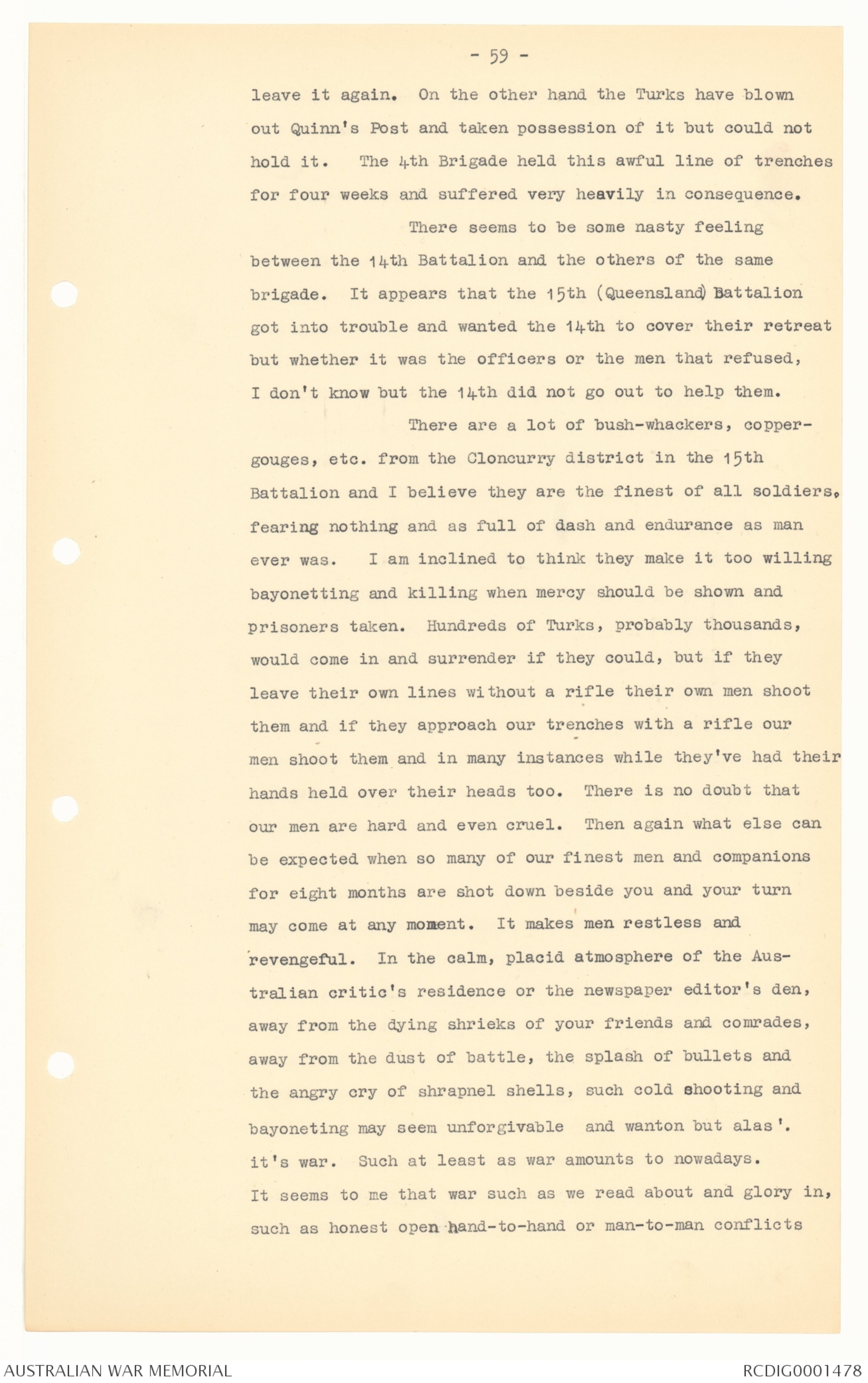
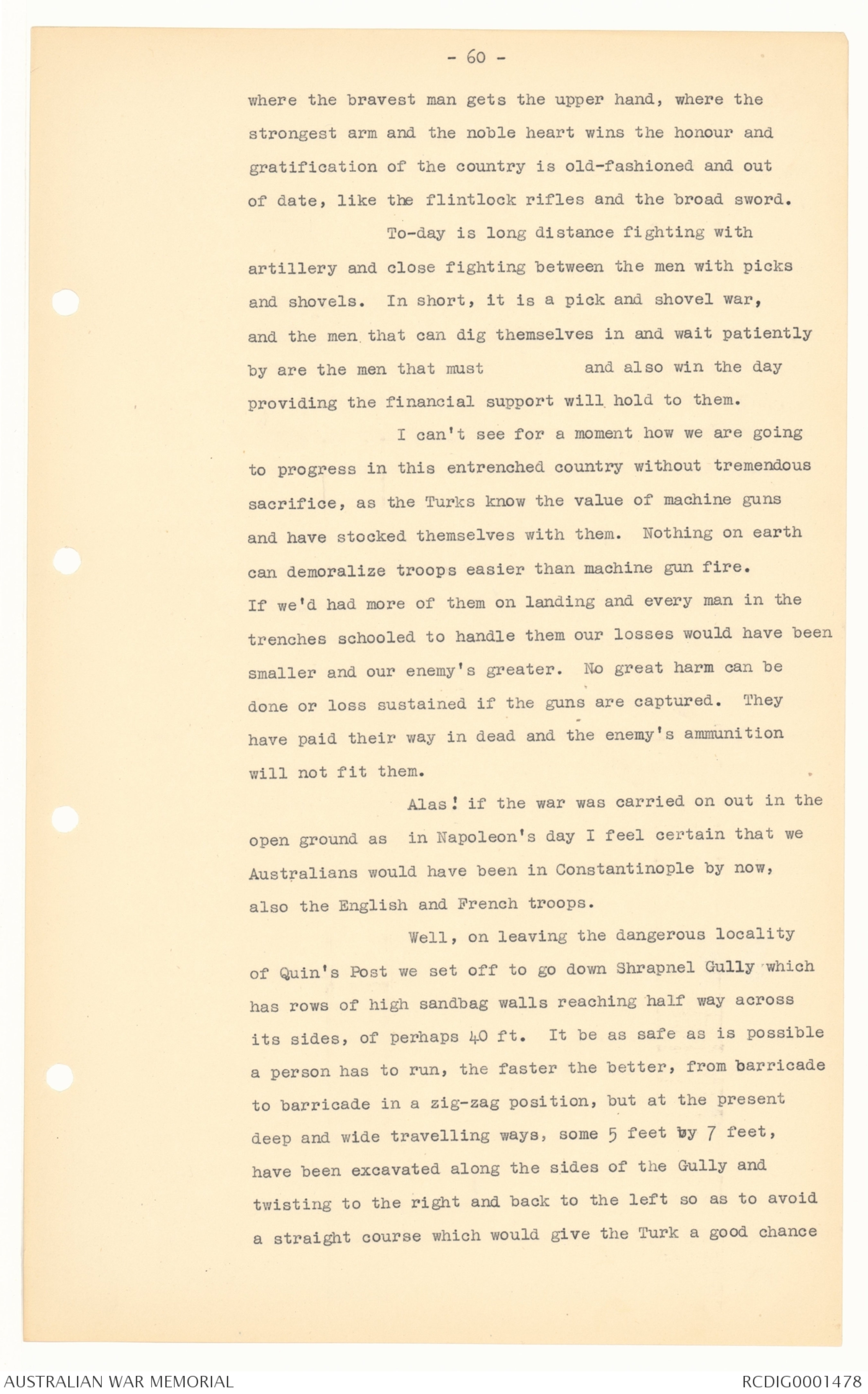
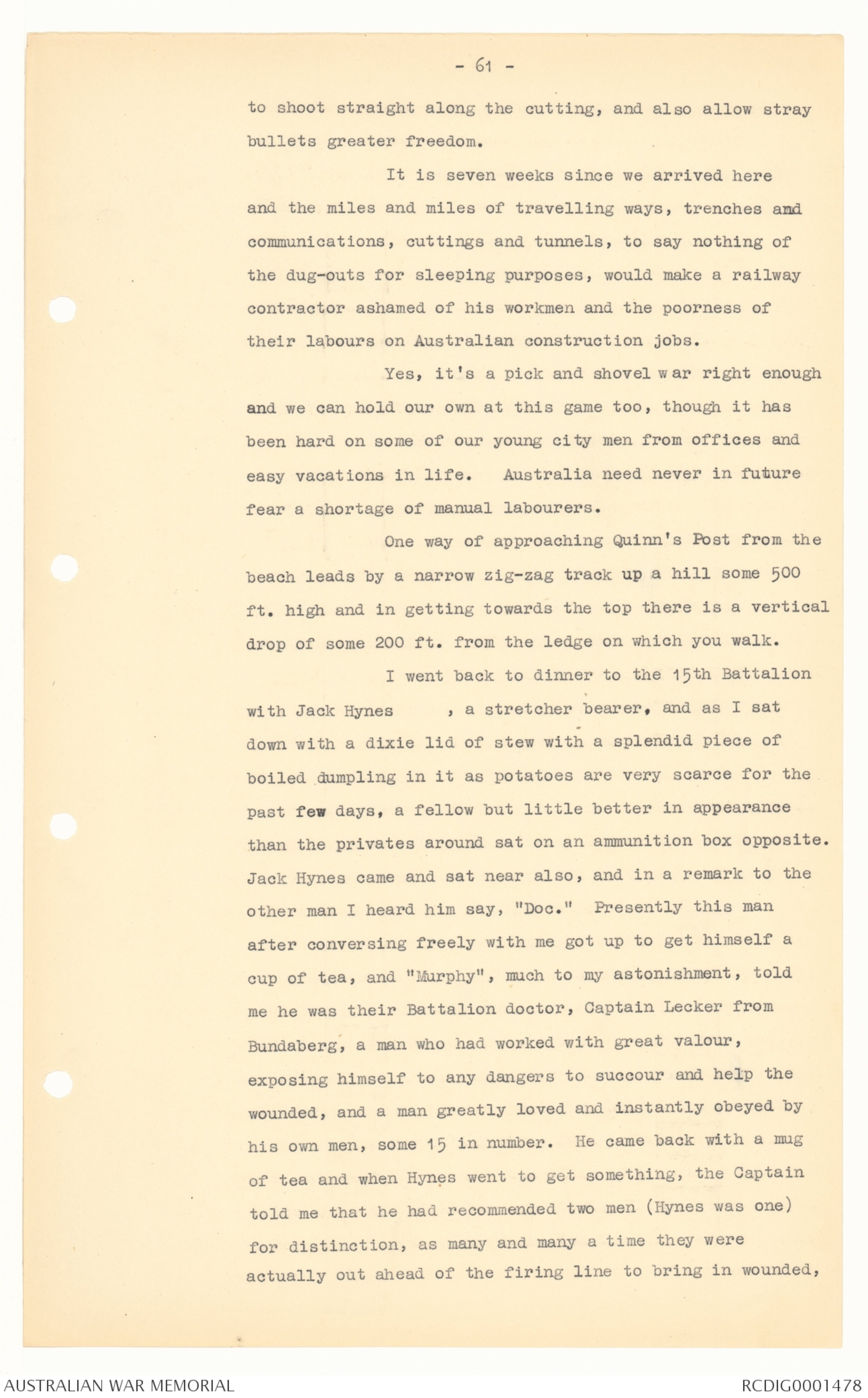
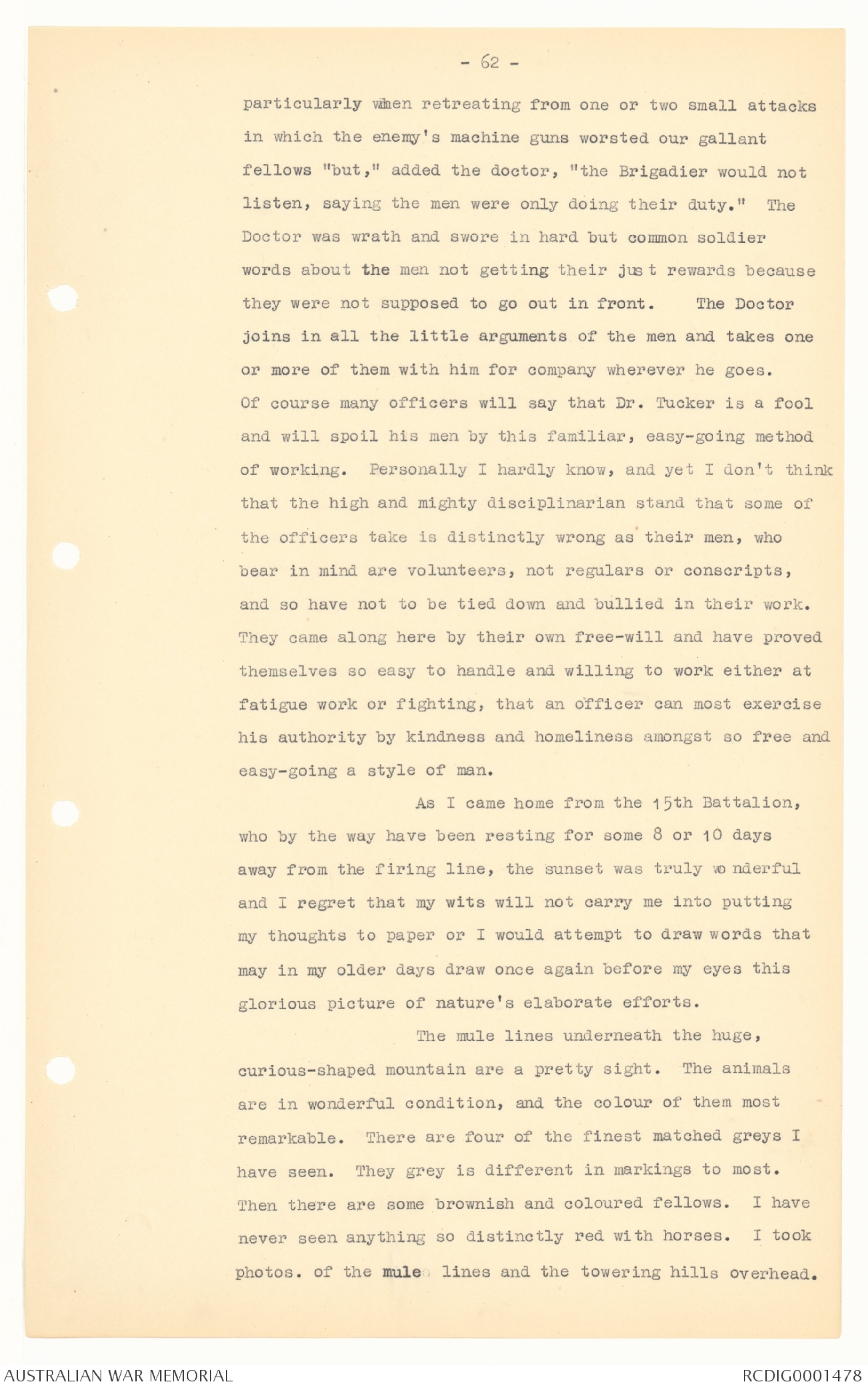
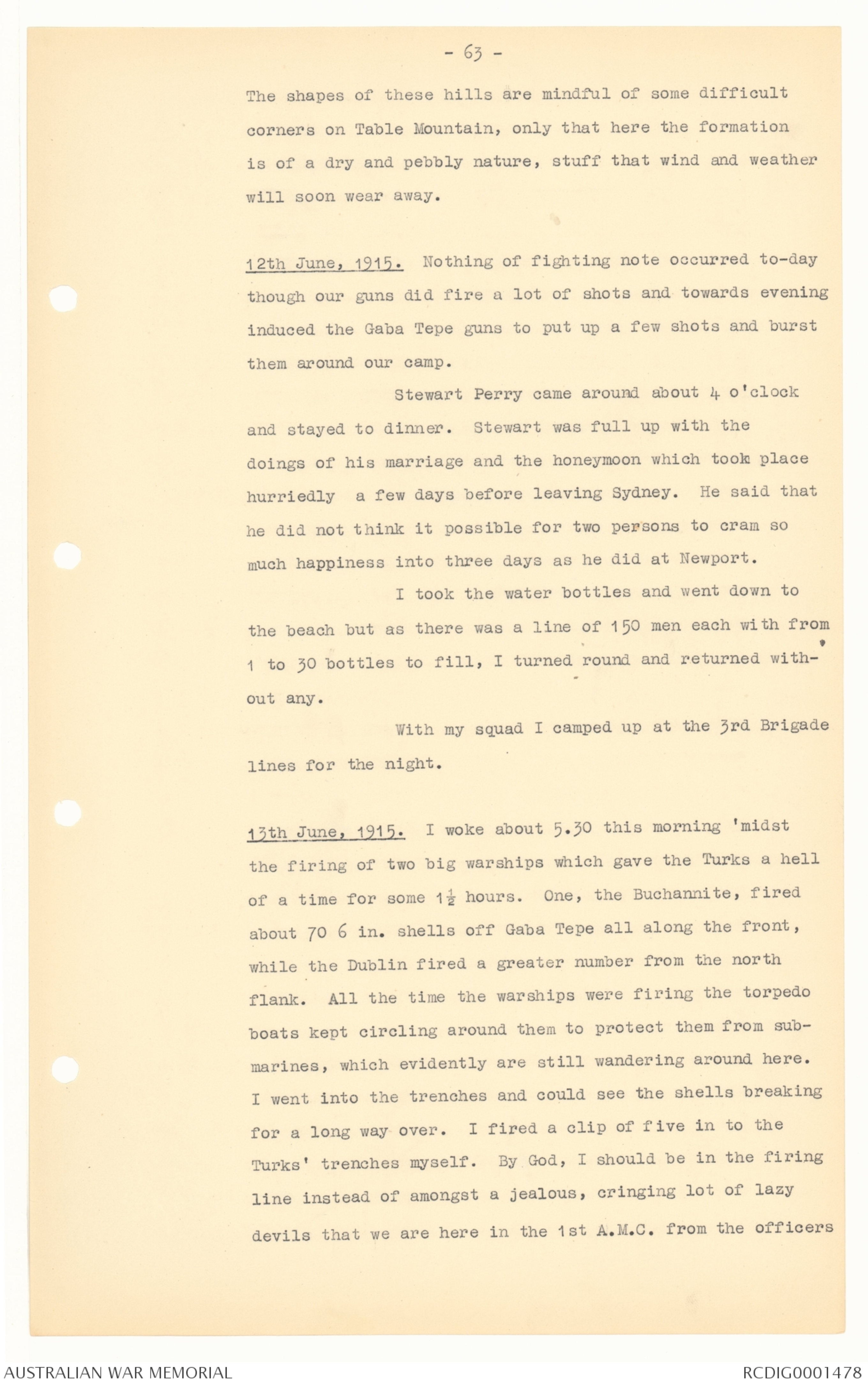
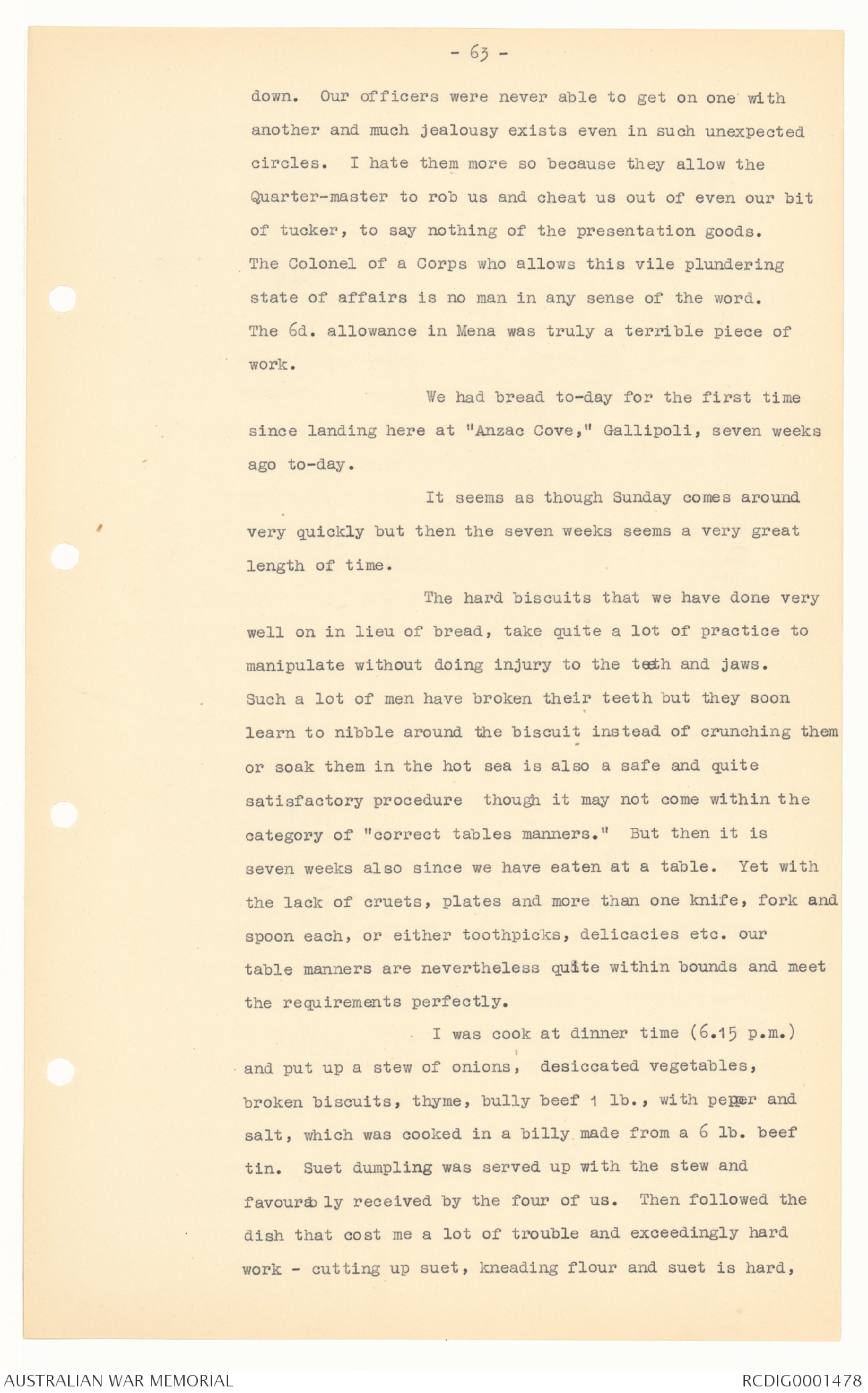
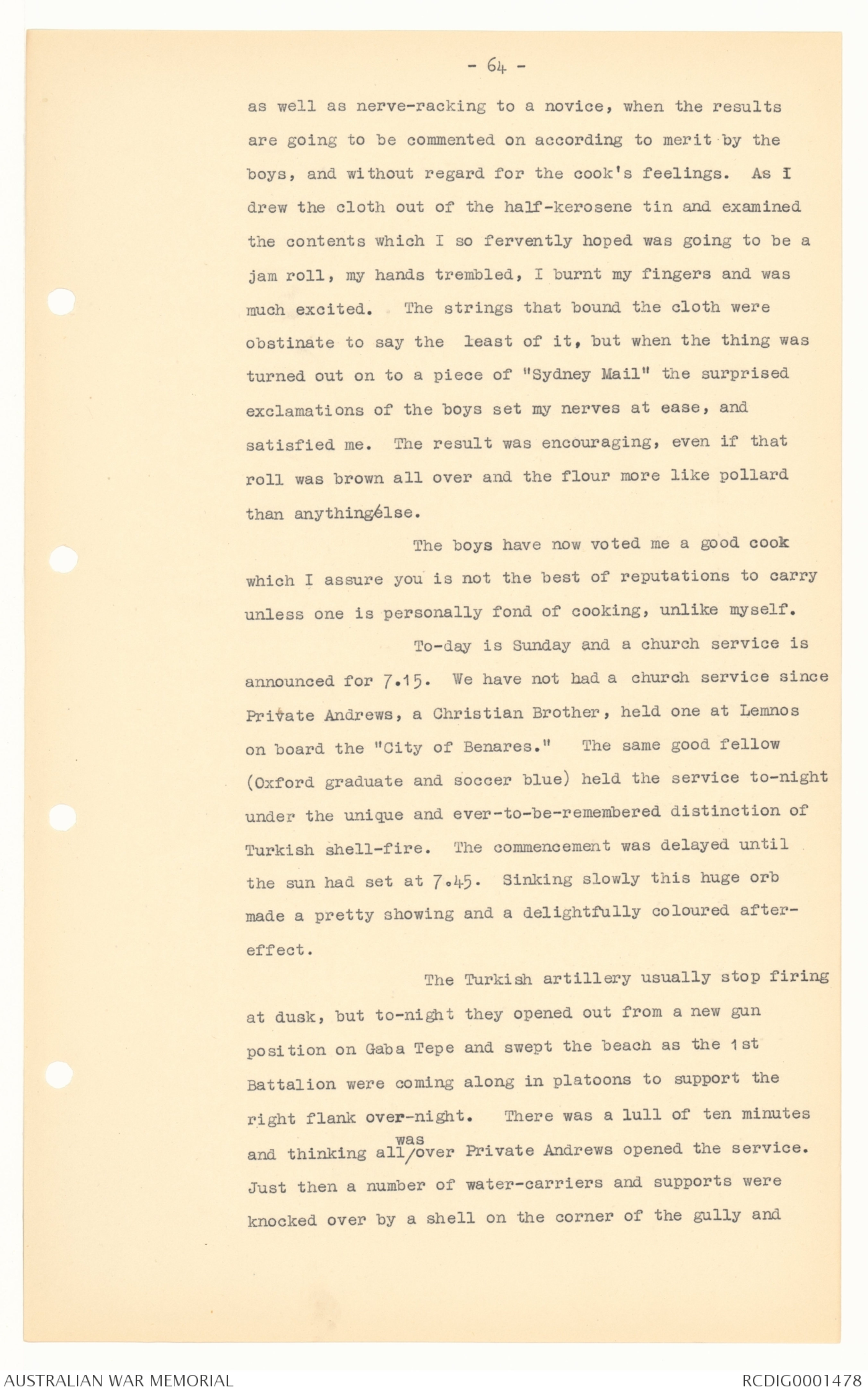
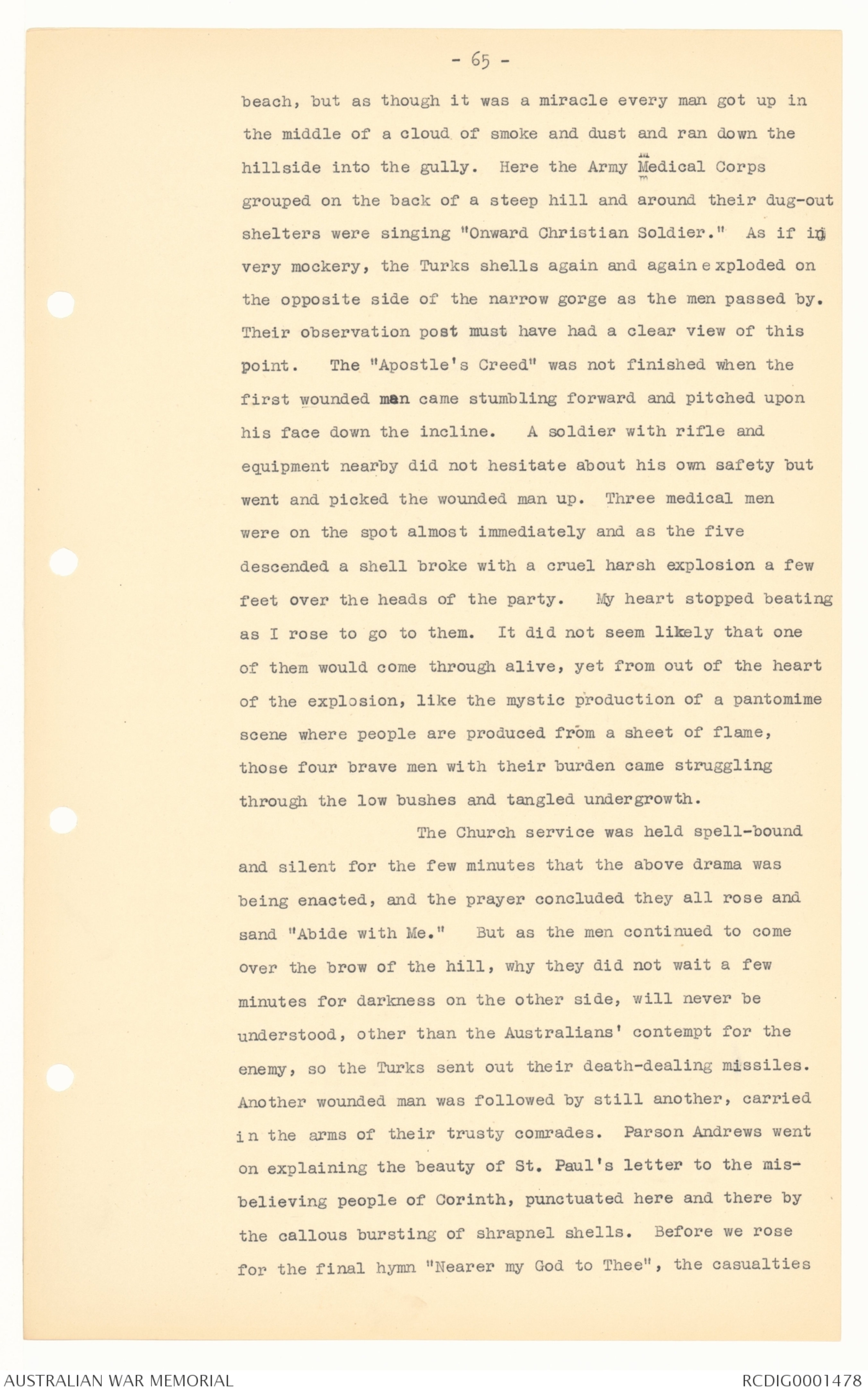
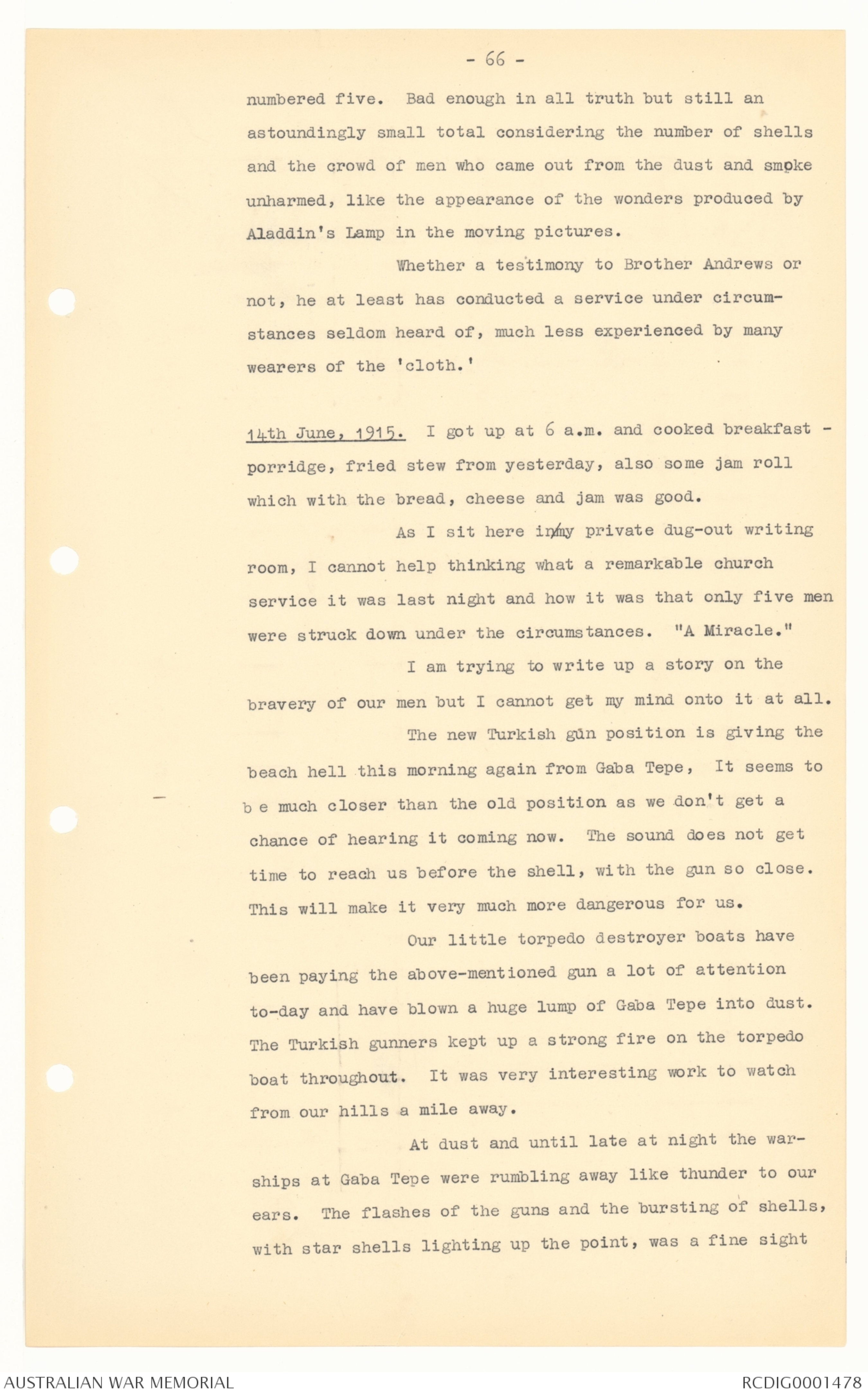
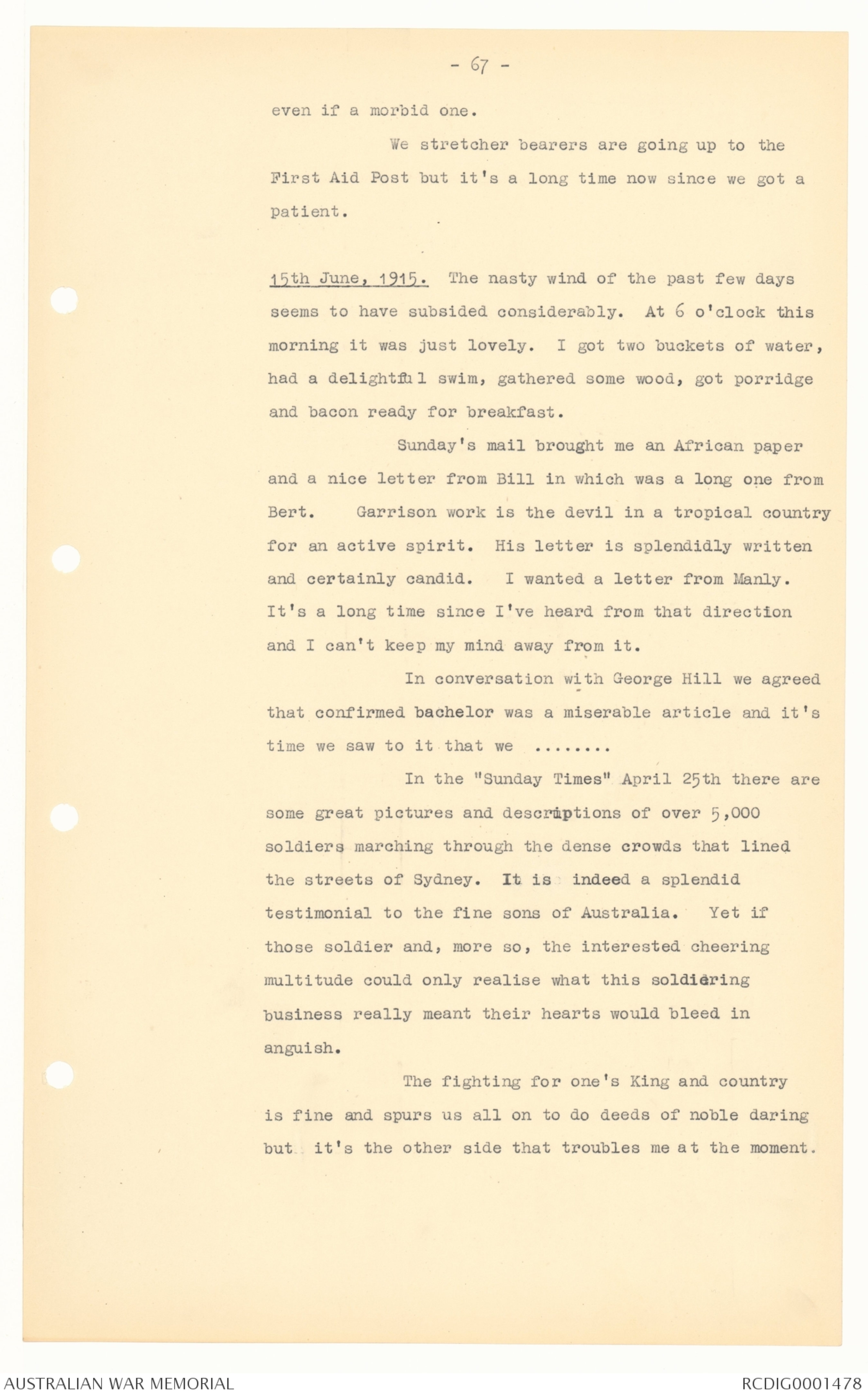
-59 -
leave it again. On the other hand the Turks have blown
out Quinn's Post and taken possession of it but could not
hold it. The 4th Brigade held this awful line of trenches
for four weeks and suffered very heavily in consequence.
There seems to be some nasty feeling
between the 14th Battalion and the others of the same
brigade. It appears that the 15th (Queensland) Battalion
got into trouble and wanted the 14th to cover their retreat
but whether it was the officers or the men that refused,
I don't know but the 14th did not go out to help them.
There are a lot of bush-whackers, copper-gouges,
etc. from the Cloncurry district in the 15th
Battalion and I believe they are the finest of all soldiers,
fearing nothing and as full of dash and endurance as man
ever was. I am inclined to think they make it too willing
bayonetting and killing when mercy should be shown and
prisoners taken. Hundreds of Turks, probably thousands,
would come in and surrender if they could, but if they
leave their own lines without a rifle their own men shoot
them and if they approach our trenches with a rifle our
men shoot them and in many instances while they've had their
hands held over their heads too. There is no doubt that
our men are hard and even cruel. Then again what else can
be expected when so many of our finest men and companions
for eight months are shot down beside you and your turn
may come at any moment. It makes men restless and
revengeful. In the calm, placid atmosphere of the Australian
critic's residence or the newspaper editor's den,
away from the dying shrieks of your friends and comrades,
away from the dust of battle, the splash of bullets and
the angry cry of shrapnel shells, such cold shooting and
bayoneting may seem unforgivable, and wanton but alas'.
it's war. Such at least as war amounts to nowadays.
It seems to me that war such as we read about and glory in,
such as honest open hand-to-hand or man-to-man conflicts
-60-
where the bravest man gets the upper hand, where the
strongest arm and the noble heart wins the honour and
gratification of the country is old-fashioned and out
of date, like the flintlock rifles and the broad sword.
To-day is long distance fighting with
artillery and close fighting between the men with picks
and shovels. In short, it is a pick and shovel war,
and the men that can dig themselves in and wait patiently
by are the men that must and also win the day
providing the financial support will hold to them.
I can’t see for a moment how we are going
to progress in this entrenched country without tremendous
sacrifice, as the Turks know the value of machine guns
and have stocked themselves with them. Nothing on earth
can demoralize troops easier than machine gun fire.
If we'd had more of them on landing and every man in the
trenches schooled to handle them our losses would have been
smaller and our enemy's greater. No great harm can be
done or loss sustained if the guns are captured. They
have paid their way in dead and the enemy's ammunition
will not fit them.
Alas! if the war was carried on out in the
open ground as in Napoleon's day I feel certain that we
Australians would have been in Constantinople by now,
also the English and French troops.
Well, on leaving the dangerous locality
of Quin's Post we set off to go down Shrapnel Gully which
has rows of high sandbag walls reaching half way across
its sides, of perhaps 40 ft. It be as safe as is possible
a person has to run, the faster the better, from barricade
to barricade in a zig-zag position, but at the present
deep and wide travelling ways, some 5 feet by 7 feet,
have been excavated along the sides of the Gully and
twisting to the right and back to the left so as to avoid
a straight course which would give the Turk a good chance
-61-
to shoot straight along the cutting, and also allow stray
bullets greater freedom.
It is seven weeks since we arrived here
and the miles and miles of travelling ways, trenches and
communications, cuttings and tunnels, to say nothing of
the dug-outs for sleeping purposes, would make a railway
contractor ashamed of his workmen and the poorness of
their labours on Australian construction jobs.
Yes, it's a pick and shovel war right enough
and we can hold our own at this game too, though it has
been hard on some of our young city men from offices and
easy vacations in life. Australia need never in future
fear a shortage of manual labourers.
One way of approaching Quinn's Post from the
beach leads by a narrow zig-zag track up a hill some 500
ft. high and in getting towards the top there is a vertical
drop of some 200 ft. from the ledge on which you walk.
I went back to dinner to the 15th Battalion
with Jack Hynes , a stretcher bearer, and as I sat
down with a dixie lid of stew with a splendid piece of
boiled dumpling in it as potatoes are very scarce for the
past few days, a fellow but little better in appearance
than the privates around sat on an ammunition box opposite.
Jack Hynes came and sat near also, and in a remark to the
other man I heard him say, "Doc." Presently this man
after conversing freely with me got up to get himself a
cup of tea, and "Murphy", much to my astonishment, told
me he was their Battalion doctor, Captain Lecker from
Bundaberg, a man who had worked with great valour,
exposing himself to any dangers to succour and help the
wounded, and a man greatly loved and instantly obeyed by
his own men, some 15 in number. He came back with a mug
of tea and when Hynes went to get something, the Captain
told me that he had recommended two men (Hynes was one)
for distinction, as many and many a time they were
actually out ahead of the firing line to bring in wounded,
-62-
particularly when retreating from one or two small attacks
in which the enemy's machine guns worsted our gallant
fellows "but," added the doctor, "the Brigadier would not
listen, saying the men were only doing their duty." The
Doctor was wrath and swore in hard but common soldier
words about the men not getting their just rewards because
they were not supposed to go out in front. The Doctor
joins in all the little arguments of the men and takes one
or more of them with him for company wherever he goes.
Of course many officers will say that Dr. Tucker is a fool
and will spoil his men by this familiar, easy-going method
of working. Personally I hardly know, and yet I don’t think
that the high and mighty disciplinarian stand that some of
the officers take is distinctly wrong as their men, who
bear in mind are volunteers, not regulars or conscripts,
and so have not to be tied down and bullied in their work.
They came along here by their own free-will and have proved
themselves so easy to handle and willing to work either at
fatigue work or fighting, that an officer can most exercise
his authority by kindness and homeliness amongst so free and
easy-going a style of man.
As I came home from the 15th Battalion,
who by the way have been resting for some 8 or 10 days
away from the firing line, the sunset was truly wonderful
and I regret that my wits will not carry me into putting
my thoughts to paper or I would attempt to draw words that
may in my older days draw once again before my eyes this
glorious picture of nature's elaborate efforts.
The mule lines underneath the huge,
curious-shaped mountain are a pretty sight. The animals
are in wonderful condition, and the colour of them most
remarkable. There are four of the finest matched greys I
have seen. They grey is different in markings to most.
Then there are some brownish and coloured fellows. I have
never seen anything so distinctly red with horses. I took
photos. of the mule lines and the towering hills overhead.
-63 -
The shapes of these hills are mindful of some difficult
corners on Table Mountain, only that here the formation
is of a dry and pebbly nature, stuff that wind and weather
will soon wear away.
12th June, 1915. Nothing of fighting note occurred to-day
though our guns did fire a lot of shots and towards evening
induced the Gaba Tepe guns to put up a few shots and burst
them around our camp.
Stewart Perry came around about 4 o'clock
and stayed to dinner. Stewart was full up with the
doings of his marriage and the honeymoon which took place
hurriedly a few days before leaving Sydney. He said that
he did not think it possible for two persons to cram so
much happiness into three days as he did at Newport.
I took the water bottles and went down to
the beach but as there was a line of 150 men each with from
1 to 30 bottles to fill, I turned round and returned without
any.
With my squad I camped up at the 3rd Brigade
lines for the night.
13th June, 1915. I woke about 5.30 this morning 'midst
the firing of two big warships which gave the Turks a hell
of a time for some 1½ hours. One, the Buchannite, fired
about 70 6 in. shells off Gaba Tepe all along the front,
while the Dublin fired a greater number from the north
flank. All the time the warships were firing the torpedo
boats kept circling around them to protect them from submarines,
which evidently are still wandering around here.
I went into the trenches and could see the shells breaking
for a long way over. I fired a clip of five in to the
Turks' trenches myself. By God, I should be in the firing
line instead of amongst a jealous, cringing lot of lazy
devils that we are here in the 1st A.M.C. from the officers
- 63 -
down. Our officers were never able to get on one with
another and much jealousy exists even in such unexpected
circles. I hate them more so because they allow the
Quarter-master to rob us and cheat us out of even our bit
of tucker, to say nothing of the presentation goods.
The Colonel of a Corps who allows this vile plundering
state of affairs is no man in any sense of the word.
The 6d. allowance in Mena was truly a terrible piece of
work.
We had bread to-day for the first time
since landing here at "Anzac Cove," Gallipoli, seven weeks
ago to-day.
It seems as though Sunday comes around
very quickly but then the seven weeks seems a very great
length of time.
The hard biscuits that we have done very
well on in lieu of bread, take quite a lot of practice to
manipulate without doing injury to the teeth and jaws.
Such a lot of men have broken their teeth but they soon
learn to nibble around the biscuit instead of crunching them
or soak them in the hot sea is also a safe and quite
satisfactory procedure though it may not come within the
category of "correct tables manners." But then it is
seven weeks also since we have eaten at a table. Yet with
the lack of cruets, plates and more than one knife, fork and
spoon each, or either toothpicks, delicacies etc. our
table manners are nevertheless quite within bounds and meet
the requirements perfectly.
I was cook at dinner time (6.15 p.m.)
and put up a stew of onions, desiccated vegetables,
broken biscuits, thyme, bully beef 1 lb., with pepper and
salt, which was cooked in a billy made from a 6 lb. beef
tin. Suet dumpling was served up with the stew and
favourably received by the four of us. Then followed the
dish that cost me a lot of trouble and exceedingly hard
work - cutting up suet, kneading flour and suet is hard,
-64 -
as well as nerve-racking to a novice, when the results
are going to be commented on according to merit by the
boys, and without regard for the cook's feelings. As I
drew the cloth out of the half-kerosene tin and examined
the contents which I so fervently hoped was going to be a
jam roll, my hands trembled, I burnt my fingers and was
much excited. The strings that bound the cloth were
obstinate to say the least of it, but when the thing was
turned out on to a piece of "Sydney Mail" the surprised
exclamations of the boys set my nerves at ease, and
satisfied me. The result was encouraging, even if that
roll was brown all over and the flour more like pollard
than anything/else.
The boys have now voted me a good cook
which I assure you is not the best of reputations to carry
unless one is personally fond of cooking, unlike myself.
To-day is Sunday and a church service is
announced for 7.15. We have not had a church service since
Private Andrews, a Christian Brother, held one at Lemnos
on board the "City of Benares." The same good fellow
(Oxford graduate and soccer blue) held the service to-night
under the unique and ever-to-be-remembered distinction of
Turkish shell-fire. The commencement was delayed until
the sun had set at 7.45. Sinking slowly this huge orb
made a pretty showing and a delightfully coloured aftereffect.
The Turkish artillery usually stop firing
at dusk, but to-night they opened out from a new gun
position on Gaba Tepe and swept the beach as the 1st
Battalion were coming along in platoons to support the
right flank over-night. There was a lull of ten minutes
and thinking all/^was over Private Andrews opened the service.
Just then a number of water-carriers and supports were
knocked over by a shell on the corner of the gully and
-65-
beach, but as though it was a miracle every man got up in
the middle of a cloud of smoke and dust and ran down the
hillside into the gully. Here the Army Medical Corps
grouped on the back of a steep hill and around their dug-out
shelters were singing "Onward Christian Soldier." As if in
very mockery, the Turks shells again and again exploded on
the opposite side of the narrow gorge as the men passed by.
Their observation post must have had a clear view of this
point. The "Apostle's Creed" was not finished when the
first wounded man came stumbling forward and pitched upon
his face down the incline. A soldier with rifle and
equipment nearby did not hesitate about his own safety but
went and picked the wounded man up. Three medical men
were on the spot almost immediately and as the five
descended a shell broke with a cruel harsh explosion a few
feet over the heads of the party. My heart stopped beating
as I rose to go to them. It did not seem likely that one
of them would come through alive, yet from out of the heart
of the explosion, like the mystic production of a pantomime
scene where people are produced from a sheet of flame,
those four brave men with their burden came struggling
through the low bushes and tangled undergrowth.
The Church service was held spell-bound
and silent for the few minutes that the above drama was
being enacted, and the prayer concluded they all rose and
sand "Abide with Me." But as the men continued to come
over the brow of the hill, why they did not wait a few
minutes for darkness on the other side, will never be
understood, other than the Australians' contempt for the
enemy, so the Turks sent out their death-dealing missiles.
Another wounded man was followed by still another, carried
in the arms of their trusty comrades. Parson Andrews went
on explaining the beauty of St. Paul's letter to the misbelieving
people of Corinth, punctuated here and there by
the callous bursting of shrapnel shells. Before we rose
for the final hymn "Nearer my God to Thee", the casualties
-66 -
numbered five. Bad enough in all truth but still an
astoundingly small total considering the number of shells
and the crowd of men who came out from the dust and smoke
unharmed, like the appearance of the wonders produced by
Aladdin's Lamp in the moving pictures.
Whether a testimony to Brother Andrews or
not, he at least has conducted a service under circumstances
seldom heard of, much less experienced by many
wearers of the 'cloth.
14th June, 1915. I got up at 6 a.m. and cooked breakfast -
porridge, fried stew from yesterday, also some jam roll
which with the bread, cheese and jam was good.
As I sit here in/my private dug-out writing
room, I cannot help thinking what a remarkable church
service it was last night and how it was that only five men
were struck down under the circumstances. "A Miracle."
I am trying to write up a story on the
bravery of our men but I cannot get my mind onto it at all.
The new Turkish gun position is giving the
beach hell this morning again from Gaba Tepe, It seems to
be much closer than the old position as we don't get a
chance of hearing it coming now. The sound does not get
time to reach us before the shell, with the gun so close.
This will make it very much more dangerous for us.
Our little torpedo destroyer boats have
been paying the above-mentioned gun a lot of attention
to-day and have blown a huge lump of Gaba Tepe into dust.
The Turkish gunners kept up a strong fire on the torpedo
boat throughout. It was very interesting work to watch
from our hills a mile away.
At dust and until late at night the warships
at Gaba Tepe were rumbling away like thunder to our
ears. The flashes of the guns and the bursting of shells,
with star shells lighting up the point, was a fine sight
-67 -
even if a morbid one.
We stretcher bearers are going up to the
First Aid Post but it's a long time now since we got a
patient.
15th June, 1915. The nasty wind of the past few days
seems to have subsided considerably. At 6 o'clock this
morning it was just lovely. I got two buckets of water,
had a delightful swim, gathered some wood, got porridge
and bacon ready for breakfast.
Sunday's mail brought me an African paper
and a nice letter from Bill in which was a long one from
Bert. Garrison work is the devil in a tropical country
for an active spirit. His letter is splendidly written
and certainly candid. I wanted a letter from Manly.
It's a long time since I've heard from that direction
and I can't keep my mind away from it.
In conversation with George Hill we agreed
that confirmed bachelor was a miserable article and it's
time we saw to it that we . . . . . . . .
In the "Sunday Times" April 25th there are
some great pictures and descriptions of over 5,000
soldiers marching through the dense crowds that lined
the streets of Sydney. It is indeed a splendid
testimonial to the fine sons of Australia. Yet if
those soldier and, more so, the interested cheering
multitude could only realise what this soldiering
business really meant their hearts would bleed in
anguish.
The fighting for one's King and country
is fine and spurs us all on to do deeds of noble daring
but it's the other side that troubles me at the moment.
 Loretta Corbett
Loretta CorbettThis transcription item is now locked to you for editing. To release the lock either Save your changes or Cancel.
This lock will be automatically released after 60 minutes of inactivity.